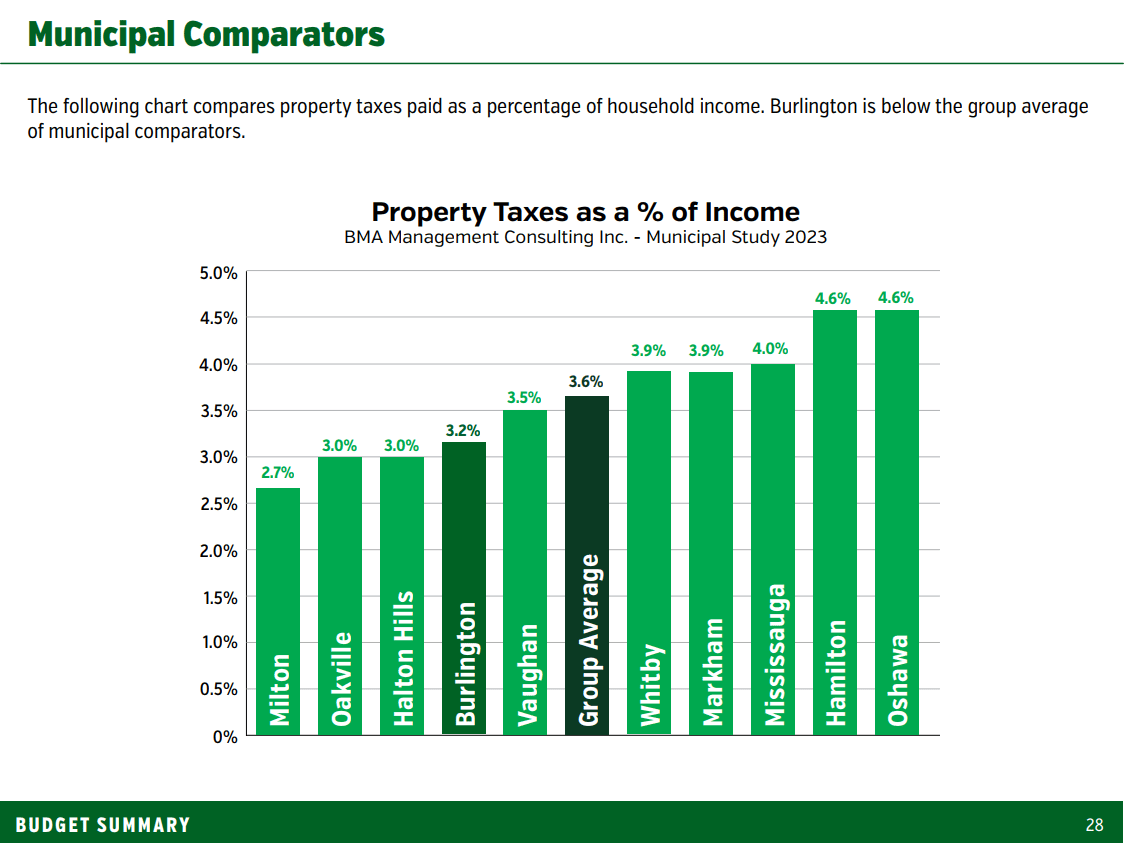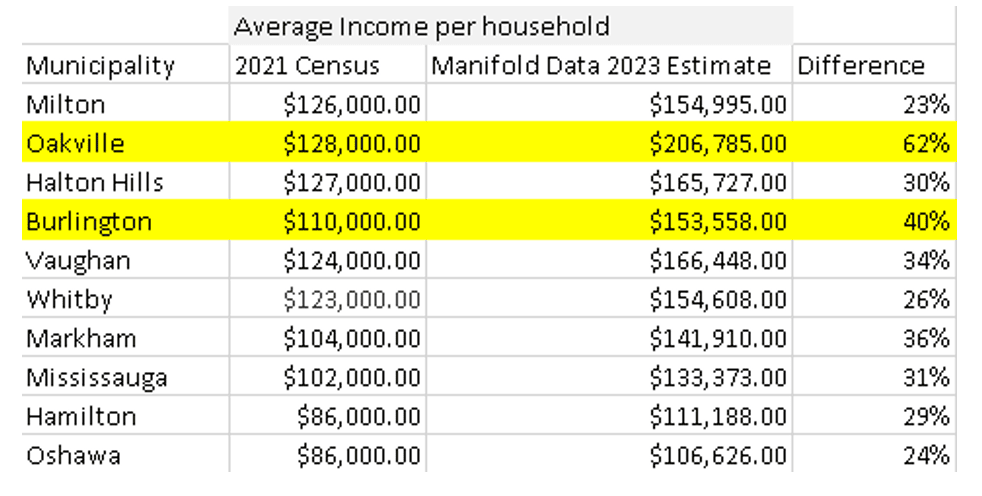Carefully explained services, efficiently delivered, services that people want and / or need are justifications for higher taxes. Is a higher average income a justification for higher property taxes?
This chart, from page 28 of the 2025 budget, compares property taxes to income. Is this a reasonable way to compare tax rates across municipalities?
Burlington must think so because they included this chart in the 2025 budget book.

Under the chart’s title, we can see that BMA Management Consulting provided the data. I searched the Burlington website for a report containing this chart and was unable to find one. Curious about the data I used Google to find the 2020 Census[i] and information from the City of Hamilton[ii] that contains some of the data used in the chart.
The Hamilton BMA report states:
“The approach used to calculate taxes as a percentage of income was to compare the average income in a municipality from the 2023 Manifold Data Mining report against the tax burden on a typical home in the municipality …”
Next stop – Manifold Data Mining. I believe they use software models to estimate current incomes based on the 2020 census data.
Here is actual data from the 2020 census compared to the data in the 2023 Hamilton BMA report.

Burlington chose not to include any information about how the data in the chart was calculated. The percentage increases that Manifold uses are curious at best.
Does the chart have any meaning and why is it in our budget book without a reference to the supporting details?
Property taxes are a blunt instrument, taxing without regard to the homeowner’s ability to pay. Including this chart in the budget book is tone-deaf. Consider someone who has lived in their home for many years, who has value in their home, but may not have the income to pay taxes. Consider a young couple, just starting out, with a huge mortgage payment, they may not have the income to pay their property taxes. Is using an average income a fair way to justify tax increases?
The city doesn’t have access to our income tax records, they can’t tax us based on our income (yet).
A higher average income is not a justification for higher property taxes.
According to the Hamilton-Burlington and Oakville-Milton real estate boards, Burlington has the lowest average home prices in Halton Region. Why do we have the highest property taxes in Halton Region?
Ruth McAughey lives in the Elizabeth Gardens area of Burlington. Ruth took the time to look at the budget and also took the time to find this census data from the last census (2020).[iii]
Ruth adds:
1) 19.6% of families in Burlington have a median employment income of $46,400 (lower than Milton, Hamilton, & Oakville). Employed female incomes are 76% of the amount earned by males.
2) 38% of Halton women over 55 and 19% of Halton men over 55 live alone. Obviously, these older adults do not have incomes comparable to households of 2.9 people.
Ruth’s question:
Is council able to ignore the impact of taxation on 20% of employed persons who pay property taxes in their rents, and ignore the burden of taxation on older persons living alone because they assume all households make $110,000.
One thing that the chart does show is that Burlington’s property taxes are the highest, as a percent of income, in Halton Region. Maybe our council should consider that fact before passing a 7.5% property tax increase.
[i] https://www12.statcan.gc.ca/census-recensement/2021/dp-pd/prof/details/page.cfm?Lang=E&SearchText=Oshawa&DGUIDlist=2021A00053518009,2021A00053524001,2021A00053521005,2021A00053525005,2021A00053518013&GENDERlist=1,2,3&STATISTIClist=1&HEADERlist=0
[ii] https://www.hamilton.ca/sites/default/files/2024-01/taxes_2023-municipal-competitiveness-study.pdf
[iii] https://www.halton.ca/getmedia/0eb6baec-8dc3-4b27-bc68-7898c30a3f64/LPS-census-infographic-3-Income-families-households-marital-status.aspx#:~:text=The%20median%20income%20within%20Halton,$100%2C000%20or%20more%20in%202020.

I just did a quick dive into Google to get some answers, Apparently, municipalities are cash-strapped, and people, myself included, have been suggesting that municipalities should be funded by an income-based tax, but I do see the problem with this approach, more taxes will trigger more frivolous spending the top of which is excessive hiring of administrative staff, which will have a regressive effect on the population as a whole.
As a society, we have a much broader set of problems which will have to be seriously discussed at some point.
In my personal opinion, municipal taxes tied to income might make sense. People with higher incomes tend to live in more expensive houses and expect more services. I take exception to basing property taxes on average incomes. This is simply unfair to people with incomes below the average.
The discussion of excessive hires was one of, too many university graduates chasing an ever-decreasing job market, and then being absorbed by all levels of government, this they accomplish by using a generational transfer of wealth via taxes for employment of a mass higher education model of the past.
With wages and benefits being an ever-increasing portion of property taxes and with a decreasing amount of funds for real service/repair/renewal we have a never-ending round of studies with a diminishing level of accomplishment.
In regards to property taxes, I agree with you, something has to be done, but what? Even with a condo-fee model, you would still be at the mercy of being outvoted by the wealthier condo owners, and a Municipal Income Tax would open the floodgates of spending by out-of-control local governments.
I’ve lived downtown for years, and am retired and fortunately can afford any tax increase, but what about the ones that can’t, the elderly, the young families, the renters, all these people are in my neighbourhood and are worried as to where they will end up in life or the end of life, these are the people I know and care about.
https://vancouver.citynews.ca/2024/03/26/canada-municipal-income-tax-policy/